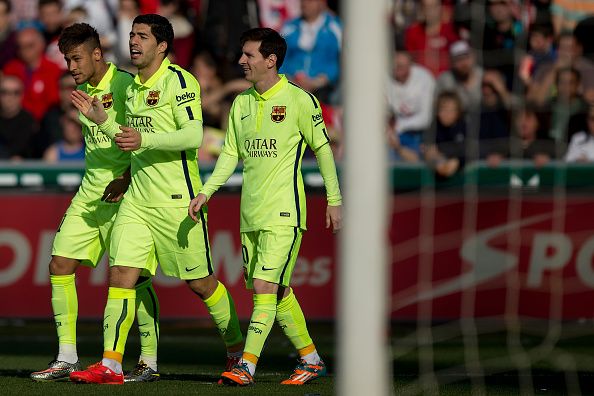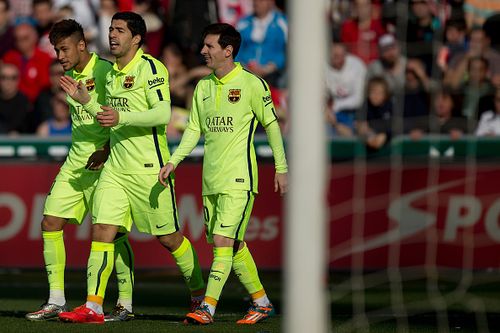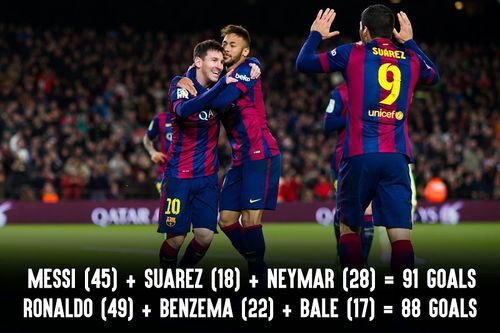
How Luis Suarez and Neymar have allowed Messi to do what he does best

If we take a little trip down memory lane, it wasn’t so long ago when we, as consumers of the La Liga product and supporters of various clubs within, were being told that Barcelona were a fading giant. Crippled by the success of the Pep Guardiola era, no future manager could possibly live up to the standards set by Barca’s 2008-2012 vintage.
The signing of Neymar sent the naysayers and doom-mongers into overdrive. Never one to resist a dig at the club he served with aplomb as player and manager, Johan Cruyff was adamant that the purchase of the Brazilian wunderkind was absolutely the wrong move.
Pete Jenson of the Daily Mail detailed Cruyff’s words to Spanish daily Marca at the time of Neymar’s capture, and they were far from complimentary:
“The problem that Barca have now is Neymar. He is a great player, that is not in question, but you cannot sign a 21-year-old and pay him more than players who have won everything there is to win. No one is God when they are just 21 years old. You cannot have two captains on one boat.”
Proving Johan Cryuff wrong
While it’s true that it has taken the Brazilian the best part of a year to settle into life in Catalonia, there isn’t too much doubt that Neymar is now one of the first names on the team-sheet. He has worked hard and displayed maturity both on and off the pitch, in order to prove Cruyff and everyone else who weighed in on the subject wrong.
Ditto Suarez.
The situation was supposedly professionally unworkable a season earlier, so imagine the outcry at Suarez’s arrival; more so because of a certain indiscretion at the World Cup. It didn’t seem plausible to many Barca fans that a club with such a proud heritage were eroding yet more vestiges of the “Mes Que un club” banner that the Catalans were incredibly proud of.
Of course, it didn’t matter a jot that Suarez had come in on the back of a record-equalling Golden Shoe tally of 31 goals, which had seen him tie with Cristiano Ronaldo as the top European marksman for league goals.
No, this was one signing too far, and there was our man Cruyff again at the coal face, chirping like the proverbial canary. This time Marca printed words he had given via his weekly column in Dutch paper De Telegraaf:
"I can't see how Barça intends to continue playing the same way, with a keen focus on team play if Messi, Neymar and Luis Suarez are in the side. The three of them are too individual. In signing him, the club are showing a preference for individual genius over a team that plays great football."
Now, no one is questioning the impact that Cruyff has made on the game of football. He stands alone as the pioneer of Barca’s attacking style of play.
But his comments have been shown to be largely inaccurate. Given that he informs so many, might it not have been a better idea for him to see exactly what each player brought to the table before passing his judgment?
What exactly have MSN brought to the table, and are they more productive than BBC?
How have the signings of both Luis Suarez and Neymar benefitted Messi, allowing him to do what he does best? What ingredients have they got that sees their triplet working in a much more productive way than the “BBC” at Real Madrid?
For a start, Neymar has really come into his own this season both individually and as a foil for Messi. Much of the last campaign was, in essence, a fact-finding mission for the Brazilian. Getting used to a new team, new colleagues and a completely different way of working.
We saw a less confident version of the player we see now, and one who was reluctant to drive forward and at the heart of defences, as he was known to do for Santos.
Fast forward a year. Aside from his obvious prowess in front of goal, we can pinpoint Neymar’s world class movement as one of the factors behind the success of the partnership. The next time Barcelona play, track Neymar’s runs when Messi is in control of the ball. Watch how easily he opens up the pitch for the Argentine to deliver with stunning accuracy – those cross-field slightly arched passes.

Equally, when Neymar has the ball and bears down on goal, look at just how many opposition players surround him or the areas in which he intends to play. Players are drawn like bees to honey, thus allowing Messi to find space that would otherwise not be available.
Of course, “Messi-dependence” has been another catch-phrase that has come to pass in the last few seasons. Neymar has definitely lightened the load in that respect, as his 29 goals and five assists, per WhoScored, would denote.
Furthermore, Messi’s meanderings around the pitch, while still noticeable, do not extend to the left side in general terms because the Brazilian is trusted to provide the necessary tools in that area.
Suarez the perfect number 9
Suarez’s role is a little simpler to explain. Barcelona have lacked a true “number nine” for a while now – probably since the departure of Samuel Eto’o. Of course, being the player that he is, Messi filled the position, but he is not a centre-forward by definition.
The Uruguayan isn’t your archetypal target man but, as he showed at PSG, he brings a presence and a physicality which is much needed in that particular position. His hybrid skill set allows for him to drift down either channel and flex with both the other members of Barca’s front line.
When pulling off to the right, he opens up that central channel for Messi to nip into and be decisive. Often coming from a deeper standpoint in the wide right position, Messi’s runs into the box are extremely difficult to track as a result.
For example, against PSG, Maxwell was the designated marker of Messi because of the particular zone (wide right) that the Argentine began the game at. If Messi started to make a run inside, then Maxwell had a split second decision to make as to whether that run should be tracked. Assuming he did not, then either Marquinhos or David Luiz had to stand tall.
But with Suarez causing all sorts of problems, both the Brazilian defenders were left with an impossible choice – face up to Messi knowing he could put the ball in behind for Suarez or Neymar, or go with Suarez and leave the gaps for Messi to exploit centrally. If Maxwell tracked Messi’s run, then we saw how he would pop the ball out wide for Montoya to cross.
Watch for the above to unfold in the second leg. Further, with Dani Alves added to the mix, we’re likely to see a lot more chances created.
After a four-month sabbatical, we are only just seeing the fruits of Suarez’s labour, and he deserves much credit for studying the various facets of Messi’s game and adapting his own to fit. That’s no easy task when you’ve been the main man elsewhere.
With 91 goals and innumerable assists between the three players, all in all it’s been a very satisfying experiment from Barcelona’s point of view.
What will Johan Cruyff say now?